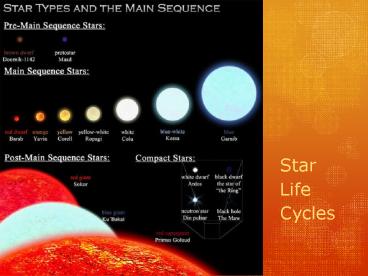Star - PowerPoint PPT Presentation
1 / 19
Title:
Star
Description:
... C Outer layers expand out White Dwarf Blue Super Giants Heavier elements Super Nova Neutron star Black ... Explosion of a large super giant by caused by gravity ... – PowerPoint PPT presentation
Number of Views:119
Avg rating:3.0/5.0
Title: Star
1
- Star
- Life
- Cycles
2
Dark Nebulas Cold Clouds of gas and dust located
in arms of galaxies.
- Gravity pulls gas and dust together to form
protostar (no fusion).
3
Young Protostars in Dark Nebula
4
MAIN SEQUENCE STARS Stars that are in the first
part of their life cycle, fusing hydrogen to
helium.
- Star size is indirectly proportional to life
span. - Star size affects temperature and color
Size Color Surface Temperature Life Span (yrs)
Small Red 3,000 K Trillions
Average (sun) Yellow 10,000 K Billions
Massive Blue 40,000 K Millions
5
Sulaphat and its two companion stars (oval
shape), 600 light years away!
- MASSIVE BLUE GIANT STARS in constellation
- LYRA
6
RED GIANTS When a main sequence star uses up all
of its hydrogen fuel and starts expanding under
helium - carbon fusion or other advanced stages
of fusion.
7
Red Giants in old star cluster M80orbiting
MilkyWay
- RED GIANTS
8
(No Transcript)
9
Star Death when fusion stops at the core and
gravity collapses the star.
M.Sequene Star Type Giant Giant Phase Fusion Event End
Red Dwarf Red Giant He - C Outer layers expand out White Dwarf
Yellow Red Giant He - C Outer layers expand out White Dwarf
Blue Super Giants Heavier elements Super Nova Neutron star Black hole
10
WHITE DWARFS - When a red giant runs out of
helium to carbon fusion, the outer layers expand
and leave a white hot core.
- Death of a low to
- medium mass star.
- This is not a
- supernova event.
11
Zoom Views of M4White Dwarfs
12
SUPERNOVA Explosion of a large super giant by
caused by gravitys crushing force.
13
Compact Cores gravity begins to change and
destroy matter.
14
- Evidence for Black Holes
- Super fast orbiting stars gas
- Radiation from poles of quasars
- Mathematics of Enormous Mass Gravity
Chandra X-Ray Super fast orbiting stars at the
center of our galaxy orbiting something invisible.
15
(No Transcript)
16
(No Transcript)
17
Galaxy M83, BLACK HOLE AT CENTER
18
(No Transcript)
19
http//chandra.harvard.edu/photo/chronological.htm
l
http//hubblesite.org/newscenter/newsdesk/archive/
releases/1996/22/































